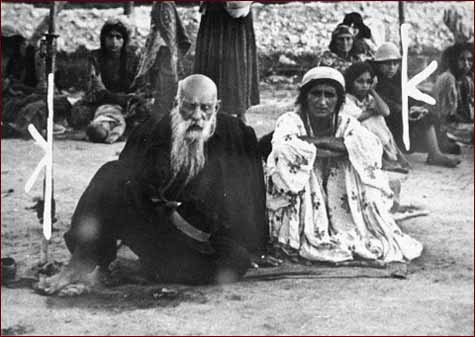I haven't dealt with the question of Northern Ireland here very much (at all?) for a number of reasons. Most pressingly because I don't know nearly as much about it as I should. Nonetheless I think it is an important issue for activists in the UK. In part, because it is a good example of the brutality of which the British State is capable (witness the
shooting of demonstrators,
collusion with Unionist death squads and
internment) only a few tens of miles from the mainland. It also highlights the moral complexities of resisting that brutality. It is easy to bandy around militant-sounding slogans declaring your "support" for this or that national liberation movement when they are fighting thousands of miles away. It's much harder to justify such simplistic sloganeering when the consequences of the resistance you are supporting is so close to home.
Anyway, the key focus of this post is the "people's revolt" (to borrow
the Grauniad's description) against the IRA gang who murdered Robert McCartney. The murder took place in January in the fiercely Republican Short Strand area (which I think is in Belfast). The details of the murder are difficult to divulge from conflicting reports (which don't even agree on whether it took place inside or outside the pub), but the thrust seems to be that McCartney, a father of two was killed by a gang of IRA members including the leader of their Belfast Brigades and was left, with friend Brendan Devine bleeding in the street. IRA men cleaned up the scene and threatened witnesses who were too frightened even to call an ambulance. Subsequent inquiries by the police have been fruitless with people who had been drinking in the pub claiming to have seen nothing.
The real reason that the story is interesting, however, is not the tragic murder itself, but the response amongst the community. Angered by the cover-up surrounding his death, McCartney's sisters and fiancee Bridgeen O'Hagans led a candlelight vigil five days after his death and were joined by 600 local residents. A month later, a protest rally drew 1,000 people.
It is difficult to gauge from the reports (which are again inconsistent) the exact sentiment of those engaged in these events.
This report, from the Women's section of the Guardian on Thursdays, implies that the protests are in part a rebellion against the IRA, perhaps even Republicanism more generally, pointing, for instance, to the emergence of anti IRA graffiti.
This report, however, which appeared on the Guardian's front page on Monday suggests that the protest is more focused, targeting primarily the excesses of a movement which the participants still support. The article refers to civil rights leader Eamon McCann who, in a speech, "recognised the contribution of paramilitaries to the struggle for equal rights and said the McCartney campaign was not against any party." Nonetheless he warned that "unless there was a people's revolt against this obvious injustice, a 'dark shadow would be cast backwards' over the whole civil rights movement."
Whatever the reality, it is clear that people are angry about ongoing "criminality" (this being the apparent euphemism for such acts in post-Good Friday Northern Ireland) perpetrated by paramilitaries within their own communities. Beowulf offers an interesting
"libertarian socialist analysis" of the problem, concluding that the IRA has become a "de facto state":
The IRA has rolled back the state and replaced it with something worse: a stateless army who keep their position through violence, intimidation and the tacit resignation of working class Catholics. Libertarians should see the IRA as an example of how power can corrupt and warp an organisation and how the state can reassert itself in many different forms.
I disagree with Beowulf's implication that the IRA has to all intents and purposes become a state, primarily because I seem to have a different definition of statehood to him, but I think that there is little doubt about the accuracy of his general thrust.
This poses a difficult question for anyone who believes in radical social change: what do you do with the people who've been doing the fighting when the war/revolution ends? In fact, the problem even applies to the official army, who to be frank have an atrocious record of looking after their former soldiers (who have an awful record of domestic violence, amongst other things). Pacifist avoid the question by suggesting that change could and should be achieved entirely non-violently. Clearly this is an ongoing debate, which merits far more time and space than I am going to dedicate to it now, but I will simply say that I remain unconvinced that there are any examples of genuinely non-violent national liberation movements which have been successful (the Indian example is much more complex than is often claimed). Those who support the right to armed resistance of oppressed peoples generally have little if anything to say on this point. Which, as the McCartney example shows, is potentially a very big problem.





















